Gut Health and Weight Balance: What You Need to Know {Lifestyle Medicine | Nutrition | Gut Health}
The Relationship Between Gut Health and Weight Balance: What You Need to Know
{Lifestyle Medicine | Nutrition | Gut Health}
Many factors influence weight beyond simply the amount of food you eat or how much you work out. Malnutrition–including obesity, underweight, and nutrient deficiencies-seem to result from the interplay between many systems:
- genetic,
- lifestyle,
- environmental and
- microbial.
A growing body of research is exploring the connection between gut health and weight and the role that the bacteria in your gut play in influencing your weight. This emerging science gives us a deeper understanding of the complex factors which impact weight and insight into new approaches to achieving a balanced weight.
Subscribe to my YouTube Channel for more Travel, Healthy Lifestyle & Recipes, Eco-Friendly Living, Mindfulness videos and more!
Affiliate Disclosure & Privacy Policy (please review our complete policy here): we use affiliate links and analytics on our website, social media posts and newsletter which utilize cookies placed on your browser to track sales activity. This post is NOT sponsored but may contain affiliate links. These statements have not been evaluated by the FDA and should not be considered medical advice or treatment. Please consult your personal health provider before making any changes to your diet or lifestyle.
The Gut Microbiome Meditates the Connection Between Gut Health and Weight
Beginning at birth, you pick up microbes that inhabit your skin, organs and tissues, including the digestive tract. The digestive tract is full of over 1,000 species of bacteria as well as viruses, fungi and other microorganisms. Together these compromise your gut microbiome.
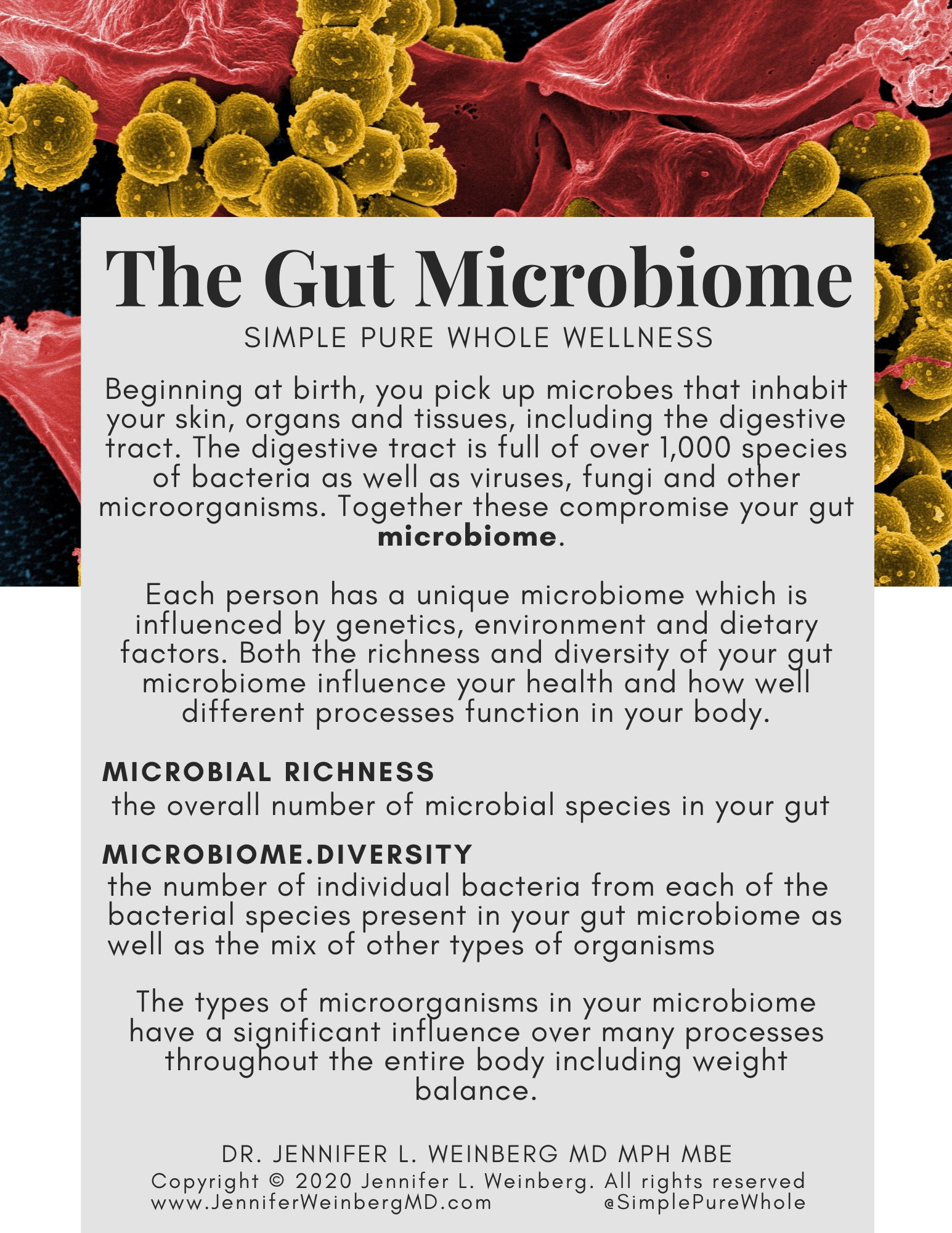
Each person has a unique microbiome which is influenced by genetics, environment and dietary factors. Both the richness and diversity of your gut microbiome influence your health and how well different processes function in your body.
Microbial richness is the overall number of microbial species in your gut microbiome.
Diversity refers to the number of individual bacteria from each of the bacterial species present in your gut microbiome as well as the mix of other types of organisms.
Gut microbiota play several crucial roles in the body, carrying out processes that you cannot achieve alone. Some of the important roles that bacteria play include:
- helping to keep the immune system in balance,
- regulating how much and what type of calories your body absorbs,
- assisting with digestion of indigestible food materials like fiber,
- influencing fatty acid metabolism,
- degrading toxins, hormones and chemicals,
- impacting how full you feel from the food you eat and your hunger signals,
- maintaining the intestinal lining, and
- producing certain vitamins, bile acids and other compounds.
Your Weight Depends on Your Bacteria
Gut health and weight interact due to the bacteria in your gut microbiome. The types of microorganisms in your microbiome have a significant influence over many processes throughout the entire body including weight balance. Overall, people who are obese have less microbial diversity. The makeup of the gut microbiome can also contribute to being underweight or having certain nutrient deficiencies.
Changes in your gut bacteria impact your metabolism or how effectively your body utilizes food for energy. Gut bacteria also influence the amount of inflammation in your body. When inflammation goes unchecked, it can cause hormonal changes which further impact your weight.
Decreased diversity in the gut microbiome is associated with many diseases which influence weight including obesity, insulin resistance, type 2 diabetes, inflammatory bowel disease, allergies and overall inflammation. Each of these conditions can influence your overall body fat, metabolic rate and weight.
For example. research shows that obese and lean people have different types of bacteria in their guts. These studies have found that leaner individuals had more diverse, anti-inflammatory gut bacteria such as those from the Bacteroidetes phylum. In comparison, individuals who were overweight or obese had significantly more inflammatory gut bacteria like those in the Firmicutes phylum as well as less bacterial diversity.
How Gut Bacteria Influence Your Weight
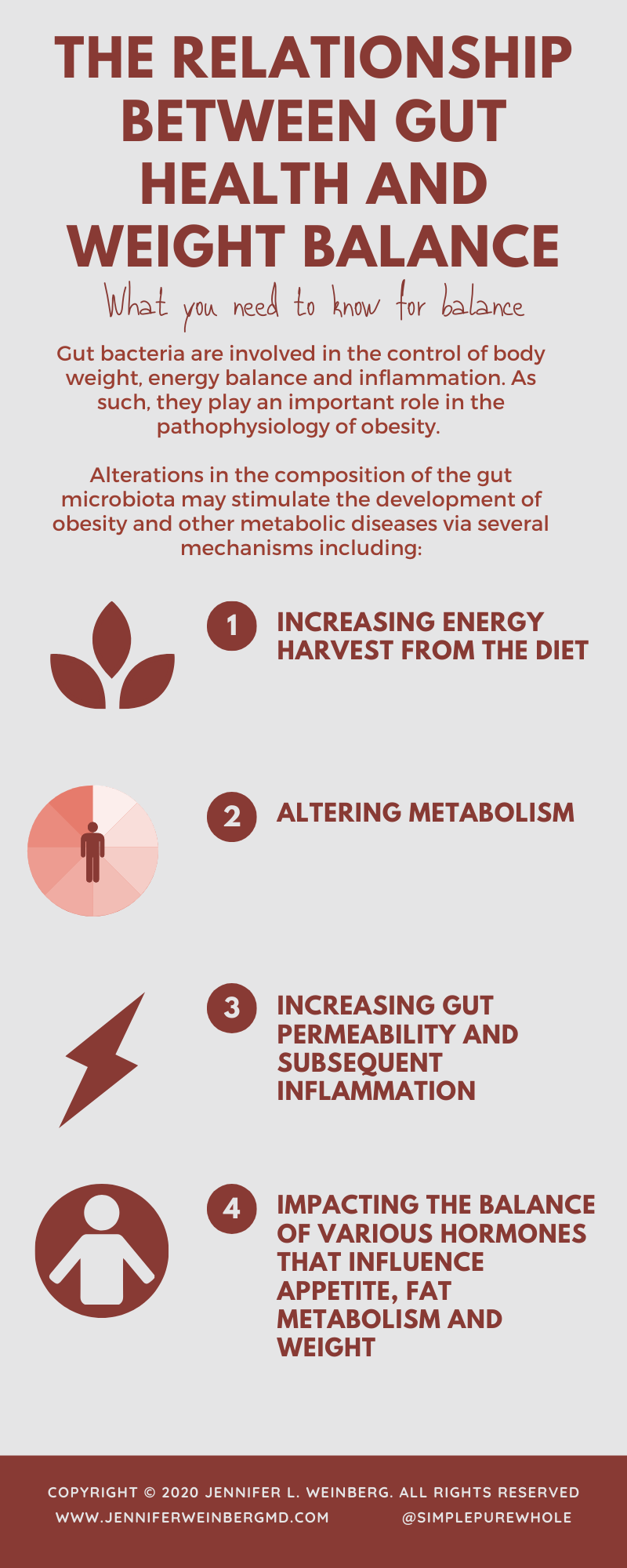
Gut bacteria are involved in the control of body weight, energy balance and inflammation. As such, they play an important role in the pathophysiology of obesity. Alterations in the composition of the gut microbiota may stimulate the development of obesity and other metabolic diseases via several mechanisms including:
- increasing energy harvest from the diet,
- altering metabolism,
- increasing gut permeability and subsequent inflammation, and
- impacting the balance of various hormones that influence appetite, fat metabolism and weight.
Gut Microbiota Influence Calorie Absorption from Food
Different types of bacteria can impact weight even without a difference in diet. One explanation for this is that Firmicutes type bacteria more completely metabolize ingested food than Bacteroidetes type bacteria. Therefore, people who have more energy-devouring Firmicutes bacteria may absorb more calories from food than lean people. Over time this more efficient absorption of calories may contribute to an increase in body fat and weight.
Gut Microbiota Regulate Intestinal Permeability and Inflammation
The intestinal lining composes an important barrier between the outside world and the inner world of your body. Your gut microbiome plays a critical role in regulating intestinal permeability. Certain strains of gut bacteria help enhance the mucosal defense of your intestinal lining, preventing the chronic inflammation that results when the intestinal barrier is breached.
This is one way that the types and amounts of microbes in your gut influence the regulation of inflammation in your body. Inflammation is a natural process in the body, but when it goes on for too long or in the wrong places, it can create damage and imbalances in hormones and weight. Chronic inflammation is an important factor in obesity, metabolic imbalance and diabetes as well as contributing to leaky gut, autoimmune disease and mood disorders.
Gut Microbiota Impact Hormones and Metabolism
The type and mix of bacteria along with the amount of inflammation in your body also impact the amount and function of different types of hormones. Specific microbes within your gut microbiome play a central role in the regulation of hormones.
Hormonal imbalances can impact how full you feel after meals, drive you to binge on or restrict foods when you’re stressed, and influence where and how much you store fat. For example, some gut microbes increase a hormone called FIAF (fasting-induced adipose factor) which tells the body to stop storing fat and burn it for energy instead.

How to Balance Your Gut Bacteria to Balance Your Weight
While some aspects of your gut bacteria are determined by genetics, lifestyle and dietary habits can have a dramatic impact on your mix of beneficial and harmful microbes. There are many lifestyle choices you can make that help to bring your gut bacteria and weight back into balance. Since many complex interactions impact weight, always check with your healthcare provider before making major changes.
Studies show that dietary changes can improve microbial richness and influence the balance of bacteria in the gut. A flourishing, balanced gut microbiome is maintained by eating a wide variety of whole foods, with an emphasis on fruits, vegetables, and fiber. An anti-inflammatory diet that is rich in a wide variety of colorful organic vegetables, natural fiber, essential phytonutrients, and naturally-occurring probiotics can help to nourish a healthy microbiome, squelch excess inflammation and keep your weight balanced.
Eat the Rainbow for Gut Health and Weight Balance

In particular, there are certain phytonutrients such as polyphenols that help boost beneficial bacteria. Polyphenols are considered prebiotics because they feed beneficial leanness-promoting bacteria like Bifidobacteria and Akkermansia muciniphila in your gut. They are also anti-inflammatory and help protect the intestinal lining. Polyphenols are natural compounds responsible for some of the bright vibrant colors of fruits and vegetables.
Polyphenols are found in many plant-based foods including:
- brightly colored vegetables,
- berries,
- grapes,
- apples,
- coffee,
- green tea, and
- chocolate/cocoa.
Incorporating a natural rainbow of plant foods helps you get a variety of beneficial phytonutrients such as polyphenols in your diet. Each color provides various health benefits, so a balance of all colors is important for overall health.
Focus on Fiber for Gut Health and Weight Balance
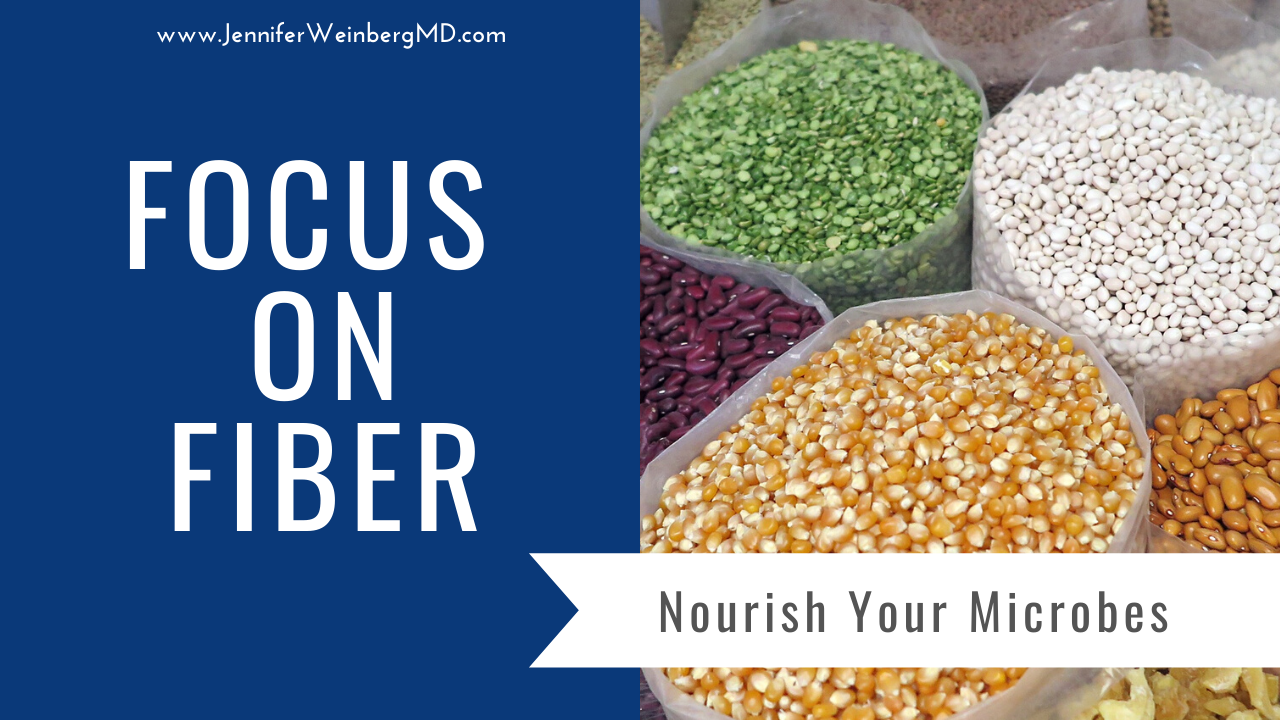
While you cannot digest fiber, your gut bacteria can. Fiber nourishes your microbes, supporting diversity and making it more likely that you will maintain a healthy weight. Opt for eating whole foods that naturally contain fiber like vegetables, fruits and whole grains.
Many of these foods also contain prebiotics, which are a type of fiber that helps your gut bacteria flourish. Feeding your bacteria prebiotics regulates inflammation, reduces gut permeability and increases satiety. Plant-based foods like sunchokes, garlic, asparagus and leeks are packed with prebiotics.
Swap Complex for Simple Carbohydrates for Gut Health and Weight Balance
Fiber is an important component of many complex carbohydrates. Bacteria need complex carbohydrates, like legumes and whole grains, to thrive. Complex carbohydrates digest more slowly than refined simple carbohydrates which allows the naturally-occurring sugars to be absorbed more slowly into the bloodstream.
The gut microbiome ferments complex carbohydrates in the diet, creating anti-inflammatory short-chain fatty acids that modulate inflammation, influence fat tissue and improve blood sugar balance. This allows them to provide steady energy for the body without causing metabolic chaos that can contribute to insulin resistance, inflammation and weight gain in the long-term.
Studies show that a diet high in added sugar leads to obesity, insulin resistance, increased gut permeability and low-grade inflammation. Reducing processed sugars and simple starches is one way to decrease inflammation and support gut microbes that contribute to weight balance. For example, cutting out processed simple sugars like candy bars and white bread stimulates “hunger” in your gut bacteria. They respond by producing more FIAF (fasting-induced adipose factor) which causes you to burn fat.
Avoid the Artificial for Gut Health and Weight Balance
Chemicals in the environment and diet may disrupt the gut microbiome. Endocrine-disrupting chemicals known as obesogens seem to contribute to metabolic dysfunction and obesity by impacting appetite, fat cell number and size, hormones and the balance of the intestinal microbiota. This is one way that gut heath and weight interact.
Examples of suspected obesogens include bisphenol A (BPA) and phthalates, which are found in many plastics and food packaging and which can migrate into foods processed or stored in plastics.
- Avoid processed additives, chemicals, and artificial ingredients in your diet to keep bacteria balanced and maintain an ideal weight.
- Some ways to reduce your toxic load are to opt for organic produce to reduce your exposure to pesticides and herbicides and
- Avoid storing or heating foods in plastics.
- Filtering your water can also reduce your exposure to chemicals that impact your microbiome.
While artificial sweeteners may seem like a safer bet when trying to lose weight, studies suggest that they may reduce beneficial gut bacteria and contribute to elevated blood sugars and metabolic dysfunction. Opt for a moderate amount of natural sweetness in your diet from seasonal fruits and vegetables like sweet potatoes.
Move Your Body for Gut Health and Weight Balance

In addition to influencing inflammation, physical activity also impacts the balance of bacteria in your gut. While the science in this area is still emerging, one way that exercise may benefit the microbiome is by boosting levels of bacteria that produce short-chain fatty acids like butyrate. Short-chain fatty acids contribute to the production of satiety hormones that curb hunger, help to regulate inflammation, improve insulin resistance to regulate metabolism and promote the survival and growth of neurons. This research suggests that even a few weeks of exercise can alter the makeup and function of the microbiome in a way that supports more balanced gut health and weight.
Exercise also helps to balance hormones like estrogen that impact weight. When it comes to exercise, more isn’t always better for weight loss though. Be mindful of what works best for your body and don’t overdo it. Stress, even from positive habits like exercise, can trigger hormonal imbalances that can contribute to inflammation and weight issues.

I hope this article gives you a better understanding of how gut health and weight are connected. Taking steps like these to keep your microbiome balanced and thriving can help you achieve a more balanced weight, a healthy digestive system and better overall health. Incorporate some of these lifestyle habits to naturally maintain a healthy weight and prevent chronic disease!
Here are some more resources for a balanced microbiome:
I would love to have you in my Insider’s Community! Join for free and receive your FREE Chapters from The Whole Cure: 52 Essential Prescriptions to Overcome Overwhelm, Reclaim Balance and Reconnect with a Life You Love! You can pick up a full paperback or Kindle copy on Amazon (affiliate link) for a wealth of insights, exercises and complete toolkit to help you uncover your true passions, authentic purpose and calm confidence as well!
To keep building your healthy lifestyle and best self through everyday habits, take the next step today to commit to a life you truly love and feel fully alive!
-
Pick up a copy of The Whole Cure (affiliate link) to build resilience and manage stress in a way that makes life flow with greater ease and joy!
-
Access guided relaxation exercises utilizing the power of the breath and mind here.
-
Join my next online group Whole Cure Lifestyle Transformation Programs to build more powerful coping strategies and skills for meaningful stress management and a calmer life! Contact me to form your own guided online group or register for the next scheduled online program!
Medical Disclaimer: Information provided in this post and related resources are for informational purposes only. Jennifer Weinberg is not providing medical advice, diagnosis or treatment information. The information is NOT intended as a substitute for the advice provided by your physician or other healthcare professional. Every body is unique so be sure to check with your healthcare professional before making any dietary or lifestyle changes taking any medication or nutritional supplement or using any treatment for a health issue. Do not use this information provided for diagnosing or treating a health problem or disease. If you suspect you have a medical problem please contact your healthcare provider promptly and do not disregard professional medical advice based on anything on this website. This website and related resources are not intended to diagnose, treat, cure or prevent disease and do not create a doctor-patient relationship between you and Jennifer Weinberg. These statements have not been evaluated by the FDA. These products are not intended to diagnose, treat, cure, or prevent any disease.
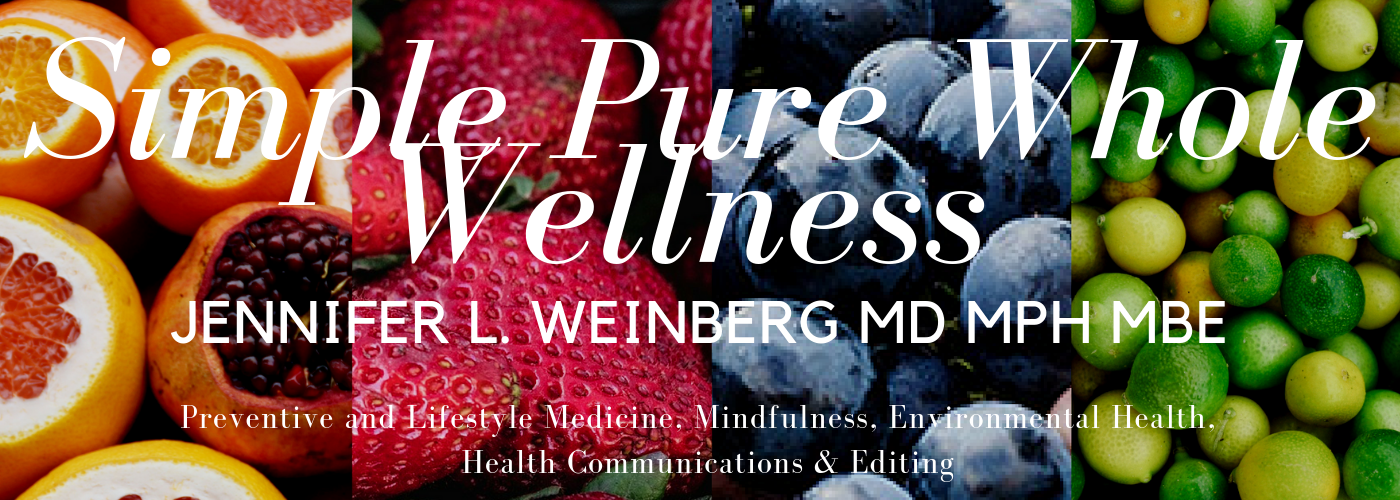


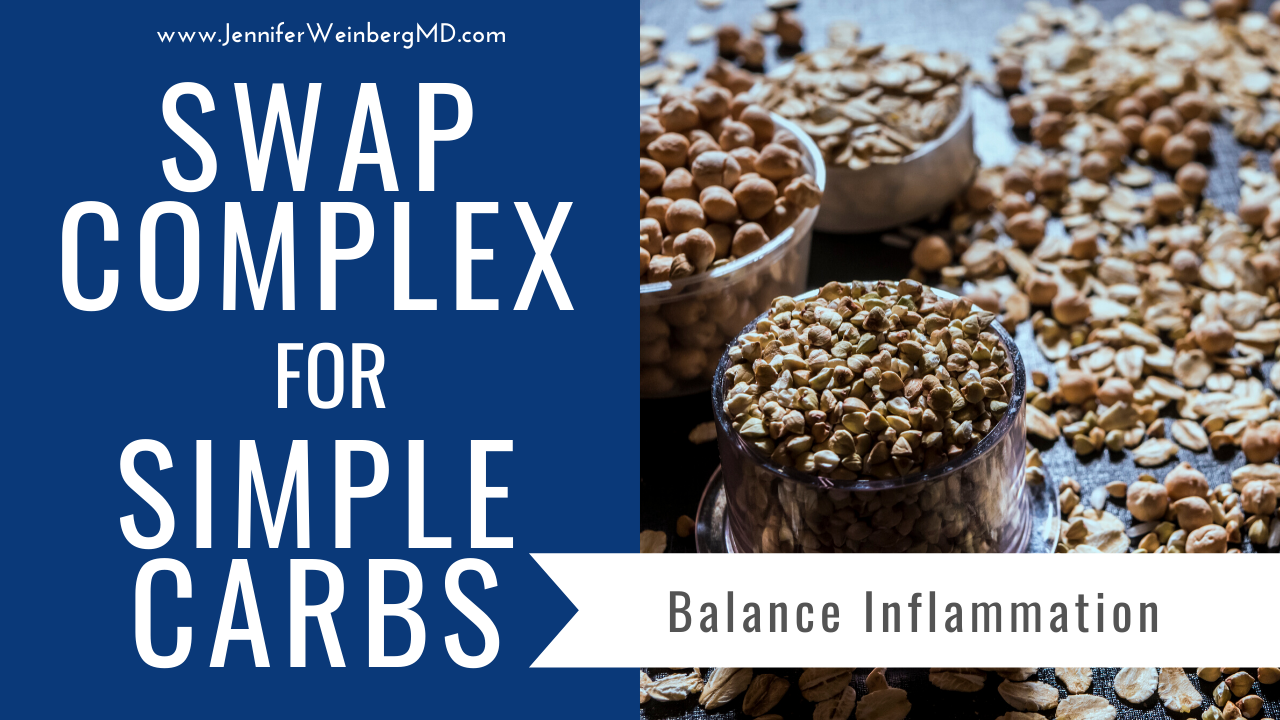

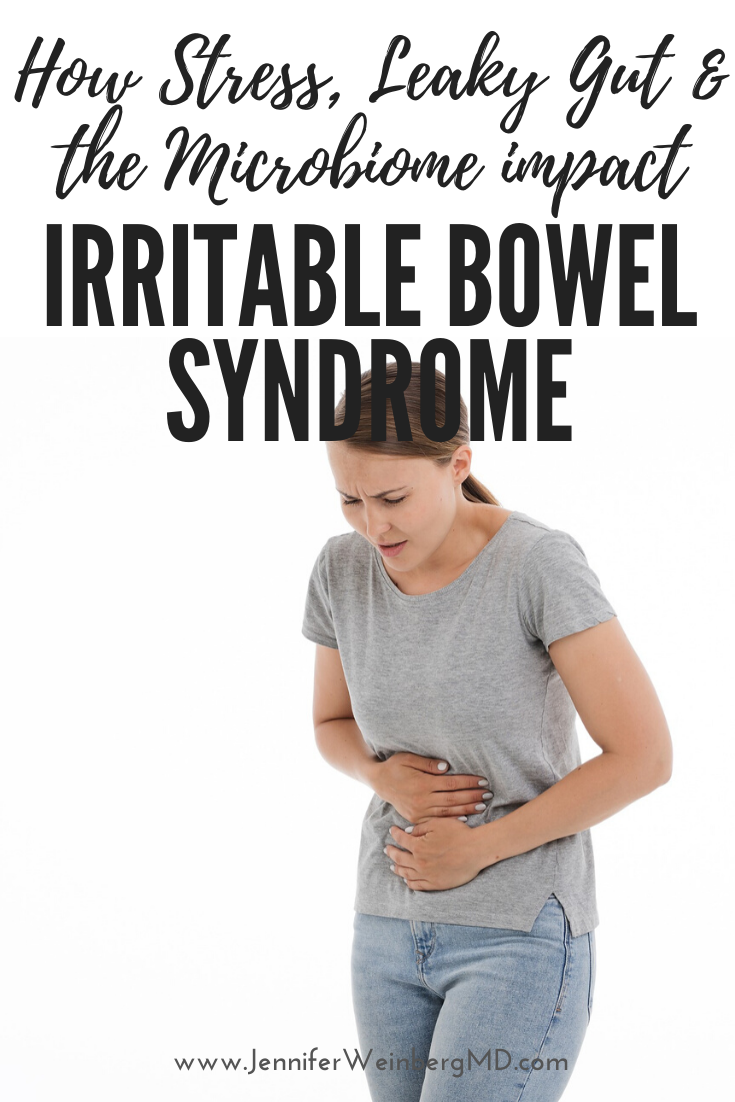


Comments